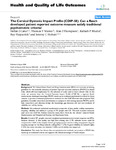The Cervical Dystonia Impact Profile (CDIP-58): Can a Rasch developed patient reported outcome measure satisfy traditional psychometric criteria?
| dc.contributor.author | Cano, SJ | |
| dc.contributor.author | Warner, TT | |
| dc.contributor.author | Thompson, AJ | |
| dc.contributor.author | Bhatia, KP | |
| dc.contributor.author | Fitzpatrick, R | |
| dc.contributor.author | Hobart, JC | |
| dc.date.accessioned | 2018-08-13T12:25:08Z | |
| dc.date.available | 2018-08-13T12:25:08Z | |
| dc.date.issued | 2008-12 | |
| dc.identifier.issn | 1477-7525 | |
| dc.identifier.issn | 1477-7525 | |
| dc.identifier.other | 58 | |
| dc.identifier.uri | http://hdl.handle.net/10026.1/12037 | |
| dc.description.abstract |
<jats:title>Abstract</jats:title> <jats:sec> <jats:title>Background</jats:title> <jats:p>The United States Food and Drug Administration (FDA) are currently producing guidelines for the scientific adequacy of patient reported outcome measures (PROMs) in clinical trials, which will have implications for the selection of scales used in future clinical trials. In this study, we examine how the Cervical Dystonia Impact Profile (CDIP-58), a rigorous Rasch measurement developed neurologic PROM, stands up to traditional psychometric criteria for three reasons: 1) provide traditional psychometric evidence for the CDIP-58 in line with proposed FDA guidelines; 2) enable researchers and clinicians to compare it with existing dystonia PROMs; and 3) help researchers and clinicians bridge the knowledge gap between old and new methods of reliability and validity testing.</jats:p> </jats:sec> <jats:sec> <jats:title>Methods</jats:title> <jats:p>We evaluated traditional psychometric properties of data quality, scaling assumptions, targeting, reliability and validity in a group of 391 people with CD. The main outcome measures used were the CDIP-58, Medical Outcome Study Short Form-36, the 28-item General Health Questionnaire, and Hospital and Anxiety and Depression Scale.</jats:p> </jats:sec> <jats:sec> <jats:title>Results</jats:title> <jats:p>A total of 391 people returned completed questionnaires (corrected response rate 87%). Analyses showed: 1) data quality was high (low missing data ≤ 4%, subscale scores could be computed for > 96% of the sample); 2) item groupings passed tests for scaling assumptions; 3) good targeting (except for the Sleep subscale, ceiling effect = 27%); 4) good reliability (Cronbach's alpha ≥ 0.92, test-retest intraclass correlations ≥ 0.83); and 5) validity was supported.</jats:p> </jats:sec> <jats:sec> <jats:title>Conclusion</jats:title> <jats:p>This study has shown that new psychometric methods can produce a PROM that stands up to traditional criteria and supports the clinical advantages of Rasch analysis.</jats:p> </jats:sec> | |
| dc.format.extent | 58- | |
| dc.format.medium | Electronic | |
| dc.language | en | |
| dc.language.iso | eng | |
| dc.publisher | Springer Science and Business Media LLC | |
| dc.subject | Humans | |
| dc.subject | Outcome Assessment, Health Care | |
| dc.subject | Psychometrics | |
| dc.subject | Reproducibility of Results | |
| dc.subject | Sickness Impact Profile | |
| dc.subject | Surveys and Questionnaires | |
| dc.subject | Torticollis | |
| dc.title | The Cervical Dystonia Impact Profile (CDIP-58): Can a Rasch developed patient reported outcome measure satisfy traditional psychometric criteria? | |
| dc.type | journal-article | |
| dc.type | Journal Article | |
| dc.type | Research Support, Non-U.S. Gov't | |
| dc.type | Validation Study | |
| plymouth.author-url | https://www.webofscience.com/api/gateway?GWVersion=2&SrcApp=PARTNER_APP&SrcAuth=LinksAMR&KeyUT=WOS:000259404900001&DestLinkType=FullRecord&DestApp=ALL_WOS&UsrCustomerID=11bb513d99f797142bcfeffcc58ea008 | |
| plymouth.issue | 1 | |
| plymouth.volume | 6 | |
| plymouth.publication-status | Published | |
| plymouth.journal | Health and Quality of Life Outcomes | |
| dc.identifier.doi | 10.1186/1477-7525-6-58 | |
| plymouth.organisational-group | /Plymouth | |
| plymouth.organisational-group | /Plymouth/Faculty of Health | |
| plymouth.organisational-group | /Plymouth/Faculty of Health/Peninsula Medical School | |
| plymouth.organisational-group | /Plymouth/REF 2021 Researchers by UoA | |
| plymouth.organisational-group | /Plymouth/REF 2021 Researchers by UoA/UoA03 Allied Health Professions, Dentistry, Nursing and Pharmacy | |
| plymouth.organisational-group | /Plymouth/Research Groups | |
| plymouth.organisational-group | /Plymouth/Research Groups/Institute of Translational and Stratified Medicine (ITSMED) | |
| plymouth.organisational-group | /Plymouth/Research Groups/Institute of Translational and Stratified Medicine (ITSMED)/CCT&PS | |
| plymouth.organisational-group | /Plymouth/Users by role | |
| plymouth.organisational-group | /Plymouth/Users by role/Academics | |
| dc.publisher.place | England | |
| dcterms.dateAccepted | 2008-08-06 | |
| dc.identifier.eissn | 1477-7525 | |
| dc.rights.embargoperiod | Not known | |
| rioxxterms.versionofrecord | 10.1186/1477-7525-6-58 | |
| rioxxterms.licenseref.uri | http://www.rioxx.net/licenses/all-rights-reserved | |
| rioxxterms.licenseref.startdate | 2008-08-06 | |
| rioxxterms.type | Journal Article/Review |


